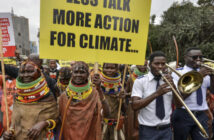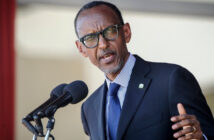Is another war imminent? What started as merely a rhetorical banter between two egoistic leaders is about to set the world aflame except cool heads prevailed and diplomatic efforts intensified. North Korea and the United States of America is safe to say are at the brink of war, a nuclear war.
The two leaders-President Donald Trump of the U.S. and Kim Jong-un of North Korea-have been trading threats the past few days. This has heightens apprehension and anxiety across the world.
The bellicose rhetorics has taken a new dimension, North Korea has revealed its plans to strike Guam, a remote Pacific Island belonging to the US. The secretive and reclusive state revealed on the country’s news channel some of the significant details of the strike, believed to be carried out in ‘mid August’, as thousands took to the streets of Pyongyang to support the statement.
President Trump warned North Korea in a statement that the U.S. will unleash ‘fire and fury’ if it didn’t stop making threats.
Analysts have been exploring ways the U.S. could effectively stop the North Koreans. With the North Korea’s missiles and nuclear facilities in dispersed and hidden places throughout the country’s mountainous terrain. Failing to hit them all would leave some 10 million people in Seoul, 38 million people in the Tokyo vicinity and tens of thousands of US military personnel in northeast Asia vulnerable to missile attacks. This option is deemed unsuitable.
A regime change in North Korea is also been mooted but analysts believe this might not achieve the desired effects as Kim’s prolonged exposure to Western values while at school in Switzerland did nothing to change his thinking and philosophy.
The sad conclusion is that an all out war since sanctions and alienation has done little or nothing to North Korea’s belligerent posture. The modalities of doing this has left military experts in limbo because of the North Korea’s missile and nuclear capabilities. “Realistically, war has to be avoided,” said John Delury, an assistant professor of international studies at Yonsei University in South Korea. “When you run any cost-benefit analysis, it’s insanity.”
If attacked, the North Korean artillery installations along the border can be deployed faster than air or naval assets and larger ballistic missiles that can target South Korean, Japanese or American bases in the region with nuclear, chemical and biological weapons. Those countries have ballistic-missile-defence systems in place but can’t guarantee they will shoot down everything.
So, the best solution is diplomacy and negotiated truce.
The Nuclear Game
The devastating effects of the the first developed and used nuclear weapons in 1945 by the U.S, when they dropped the Atomic bombs on Hiroshima and Nagasaki at the end of World War II. This act fueled the start of the “arms race,” a competition between the United States and the Soviet Union for the most effective and largest number of nuclear arms. The nuclear weapon is the greatest military arsenal in the world, having it offers a different prestige and security.
Nine countries have or are believed to have nuclear arsenals, according to the Arms Control Association: the United States, Russia, the United Kingdom, France, Israel, Pakistan, India, China and North Korea.
The United States has 6,800 warheads, second only to Russia with 7,000. France has 300, China with 270, United Kingdom 215, Pakistan 140, China 130 and Israel with nuclear warheads.
In 1970, just eight years after the Cuban Missile crisis provoked fears of nuclear war, the Treaty on the Non-Proliferation of Nuclear Weapons, or NPT, was ratified; it was extended indefinitely in 1995. Under the treaty, the five permanent members of the United Nations Security Council — China, France, Russia, the United States and the United Kingdom — were acknowledged as nuclear powers. Other countries that joined the treaty agreed not to pursue nuclear weapons development, although they are allowed to use nuclear technology for non-military purposes, like scientific research.
Israel, India and Pakistan never signed the treaty. Although Israel does not officially acknowledge their arsenal, the country is believed to possess approximately 80 warheads. North Korea signed the treaty but withdrew in 2003.




